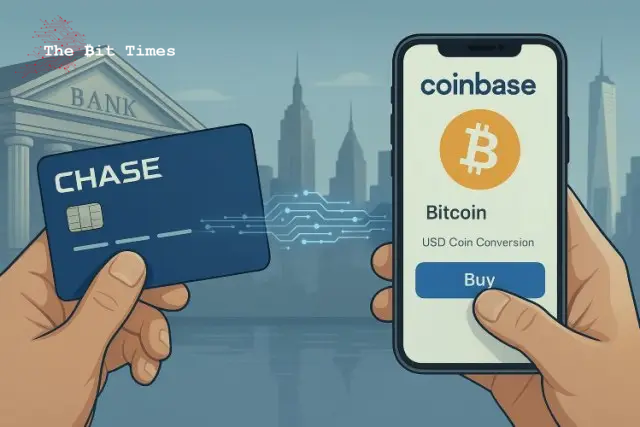JPMorgan and Coinbase Form New Bridge Between Banking and Digital Assets

JPMorgan Chase has become the first major United States bank to give its retail customers a direct route into cryptocurrencies, unveiling a strategic tie‑up with exchange Coinbase that will let Chase credit‑card holders buy digital assets and convert reward points into the USD Coin (USDC) stablecoin. The phased roll‑out, announced on 30 July, will also introduce a secure bank‑to‑wallet link for the group’s 80 million account‑holders, signalling a decisive shift by the country’s biggest lender towards mainstream adoption of crypto. Under the agreement, customers will receive $1 of USDC for every 100 Ultimate Rewards points transferred and will be able to fund their Coinbase accounts with Chase cards before the end of the year.
How the partnership works
According to the companies, the integration will be delivered in stages to manage operational risk and customer demand. Credit-card funding is scheduled for launch this autumn, followed by the rewards-point conversion and direct API-based bank-to-wallet connections in early 2026. Once live, Chase card‑holders will see Coinbase listed in their payment options and will be able to move funds without the third‑party processors that have historically added cost and delay. The Ultimate Rewards programme will, in parallel, gain a crypto tab that allows points to be swapped for USDC at the one‑cent‑per‑point rate and then traded into bitcoin, ether or any of the 250 tokens supported by the exchange.
Background and Strategic Rationale
JPMorgan executives describe the move as a response to clients who increasingly expect everyday financial services to include digital‑asset choices. Melissa Feldsher, head of payments and lending innovation, said the tie‑up “expands choice and lowers barriers” while keeping data inside the bank’s security perimeter. For Coinbase, the partnership opens a potential pipeline of tens of millions of newcomers at a time when the exchange is seeking to diversify revenue beyond trading fees. Max Branzburg, who leads the consumer unit at Coinbase, framed the arrangement as part of a broader plan to “onboard the next generation” into on‑chain finance. Both firms stress that the collaboration is non‑exclusive, leaving room for additional partners if demand materialises.
Regulatory and Risk Landscape
The announcement arrives amid heightened regulatory scrutiny of crypto platforms on both sides of the Atlantic. Coinbase remains in litigation with the US Securities and Exchange Commission over the status of several tokens, while large banks are subject to stringent anti‑money‑laundering and consumer‑protection obligations. JPMorgan says the integration will rely on the bank’s existing know‑your‑customer controls and that transactions will clear through its secure API rather than public blockchain bridges. The partnership is also notable given chief executive Jamie Dimon’s long‑held scepticism towards bitcoin; critics suggest the new service could be cited in Washington as further evidence of crypto’s creeping acceptance, while supporters argue it offers regulators greater traceability than peer‑to‑peer alternatives.
Market Reaction and Outlook
Investors have so far reacted positively. Coinbase shares rose nearly three per cent in early New York trading, extending their year‑to‑date gain to more than 50%, while JPMorgan edged half a per cent higher. Bitcoin itself was broadly steady at just under $118,000 following a week of volatility. Analysts at Keefe, Bruyette & Woods said the arrangement could generate modest fee income for JPMorgan and deepen Coinbase’s liquidity pool, though they cautioned that consumer appetite will depend on clear regulatory guidance. Rival banks have limited crypto access to exchange‑traded products or wealth‑management desks, meaning Chase customers could enjoy a first‑mover advantage if the autumn roll‑out proceeds smoothly.
Whether consumers ultimately convert their points into digital coins or stick with cash‑back, the partnership underlines the growing convergence between traditional finance and the crypto economy. Its eventual success will hinge on execution, regulation and market sentiment, but for now it stands as a significant symbolic step towards normalising crypto within mainstream banking.
Comments
Post a Comment